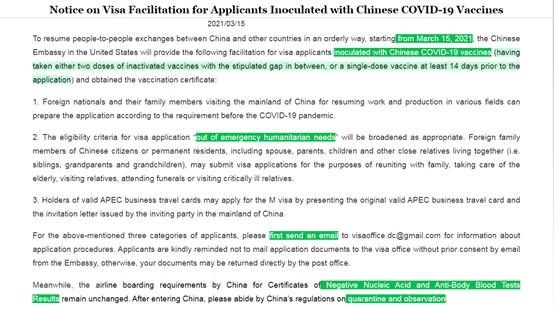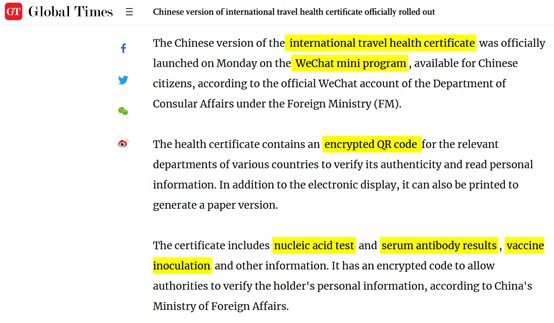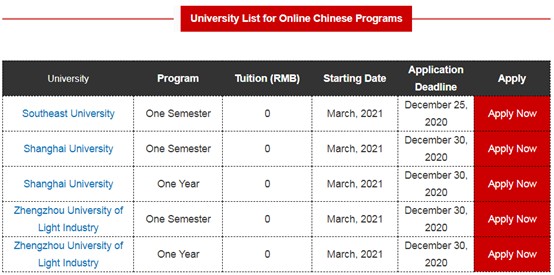I’m also an international student at a Chinese university and I feel the same anxious and disconcerted as you might do. But several days ago I found the notice of entry and quarantine policy recently issued by the Chinese Embassy in my country. With coronavirus cases declining and Chinese getting inoculated, the Chinese government does relax its border travel restrictions and foreigners do hold a hope to enter China in 2021.
From Mar. 4, 2021, the Chinese Embassies overseas have sequentially issued notices on visa applications on their websites. The versions differ a little according to the countries they are in, so you can check the very notice of your current country’s, those Chinese Embassies in countries including Belarus, Belgium, Canada,Denmark, Gabon, Germany, Hungary, India, Ireland, Italy, Israel, Japan, Malaysia, Norway, Pakistan, the Philippines, Singapore, Slovakia, Spain, Sri Lanka, South Korea, Switzerland, Thailand, the United States, the United Kingdom, Vietnam, and Hong Kong SAR. Others may follow later.
What’s on the notice?
There are two important messages on the notice.
One is that the visa applicant needs to be inoculated with the Chinese COVID-19 vaccine, having taken either two doses of inactivated vaccines with the stipulated gap in between or a single-dose vaccine at least 14 days before the application, and obtain the vaccination certificate.
Another is that the travellers who are allowed to enter China need to take with them Certificates of Negative Nucleic Acid and Anti-Body Blood Tests Results when boarding the airline. And they shall abide by China’s regulations on quarantine and observation of about 2-3 weeks after the arrival.
For your convenience, below is a screenshot of the complete notice from the Chinese Embassy in the United States.

Besides, not all applicants in all countries will be granted a visa at their will. According to the notice, only those who need to enter China for the necessary work and production resumption activities (work, business, visit etc.) may submit the applications. I think we international students can be categorized into those who need to enter China.
One notice before this posted on Sep. 23, 2020, on the website of the Ministry of Foreign Affairs allows foreign nationals to enter China with no need for applying for new visas, but the Chinese residence permits for work, personal matters and reunion must be valid. But if your Chinese residence permits expired, you have to go through the new visa application process as an international student in preparation to return to your university in China.
You have to bear in mind that China has a strict inbound policy and implements stringent entry restrictions, especially during the coronavirus period. Therefore, make sure that you check the exact details in the notice from your current country’s China Embassy. Any questions you encounter can be replied through the email address below the notice the China embassy leaves. Don’t hesitate to contact the staff and tell them you are an international student who wants to return to China.
As you know, the outbreak of COVID-19 had happened several times in China. At the earliest, the first coronavirus case was discovered in Wuhan, a megacity in central China, leading to the swift and large-scale lockdown in the country. To curb the spread of COVID-19, the Ministry of Foreign Affairs announced the temporary suspension of foreigner entry. Though the situation got better sometimes later and the entry policy had been lifted, the recurrence of COVID-19 among Beijing and the nearby province Hebei forced the Chinese government to tighten the entry restrictions again. So I highly recommend you to monitor the latest news about the pandemic and follow the dynamics of the Chinese government policy, especially about the information about international students in China.
But I predict the situation will get better and better with more people getting vaccinated. As Reuters reported two months ago, the Chinese government authorities announced that China will provide COVID-19 vaccines free of charge once they become available to the general public. And China is projected to open its border within this year.

A screenshot from Reuters News
Meanwhile, the Chinese government has launched its version of the international travel health certificate as reported by Global Times. Through the vaccine inoculation and this WeChat mini-program, I believe China will allow international students to return to China for offline courses in one foreseeable day.

A screenshot from Global Times
What you can do right now?
Ø If you find you able to enter China and your university in China permits your returning to the campus for the offline courses, remember to go through the notice on the website of the Chinese Embassy in your country and then take actions for preparation to return as required, such as
1、get inoculated by the Chinese COVID-19 vaccine
(make sure you have reached the stipulated time gap and obtained the certificate of vaccination)
2、get the Certificates of Negative Nucleic Acid and Anti-Body Blood Tests Results
(some Chinese Embassies don’t mention in their notices, but highly recommend you to double-check it by the official email address)
3、make sure your student visa is still valid
4、prepare sufficient masks and sanitizer for your airline time
5、get prepared for the self-funded quarantine and observation of about 2 or 3 weeks after you arrive in China
(don’t violate the local prevention and control policy, it may be counted as an illegal action if you do so)
One useful tip
Get a WeChat appliance on your cell phone. This appliance is of great availability, for convenience not only when you enter China but when you want to go somewhere in China. This article about how to register a WeChat account as foreigners outside of China in 2021 may help you out.
Ø But if you find out that you cannot enter China from your country or your university in China denies your returning to the offline courses, I can offer you some other suggestions through this hard time.
One is that you can attend the CUCAS online exhibition. The online exhibition provides a valuable platform where you can interact in real-time with many teachers from some renowned universities in China, such as Tsinghua University, Shanghai Jiaotong University, and Tongji University School of Medicine. It definitely is a precious opportunity to know more about your preferred university if you haven’t chosen one or just want to learn more about these prestigious ones. I had been there and learned much from the live streaming of East China University of Science and Technology. So, highly recommend you to check on the live streaming time and add it to your schedule.
 A screenshot from the live
streaming
A screenshot from the live
streaming
Another is that you can take the CUCAS online courses offered by some first-tier universities in China. Though these courses are online, they are still of high quality. Besides, you can find the free tuition fee online Chinese language programs on this website! I was quite surprised when I first found the website page. It’s very unbelievable and then I contacted the staff who confirmed this news. I’m still a little thrilled now. A truly big loss if you miss it. Believe me!
 A screenshot from CUCAS
A screenshot from CUCAS
In short, hope you can successfully return to the campus as you wish or get the course as you favor. Stay healthy during this hard COVID-19 time! Don’t forget to like and recommend my answer if you consider it helpful!